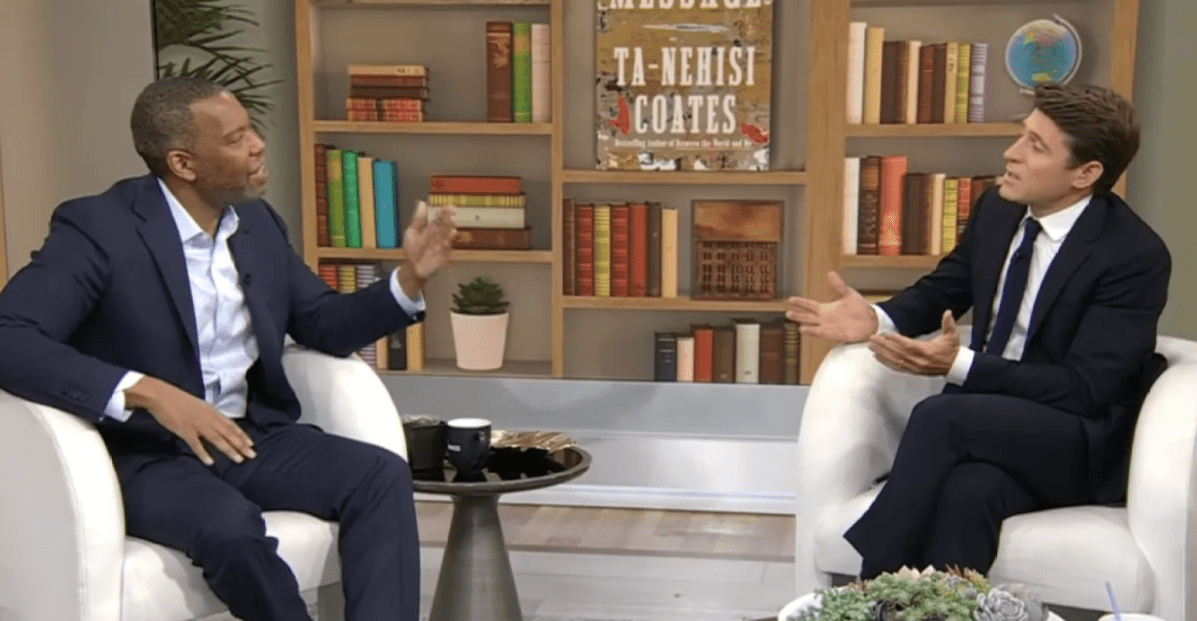CBS News is facing a civil war over presenter Tony Dokoupil’s interview with Ta-Nehisi Coates. Accusations are coming from within the network that Dokoupil, who pushed back on Coates’s more dramatic claims, was overly aggressive. The interview earlier this week, centered on Coates’s latest book about the Israel-Palestine conflict, has triggered some tortured internal debate about what the role of a journalist is — and if there’s a double standard at work when subjects such as Coates, a darling of the social justice movement, are involved.
‘Why leave out that Israel is surrounded by countries that want to eliminate it?’ Dokoupil asked Coates, referring to the latter’s book on the current conflict. ‘Why leave out that Israel deals with terror groups that want to eliminate it?’
This line of questioning, however, was deemed a bridge too far. ‘We have to check our biases and opinions at the door,’ CBS’s head of newsgathering, Andrienne Roark, said during an editorial call on Monday. ‘We are here to report the news without fear or favor.’
Dokoupil was chastised for the interview, with CBS News executives bringing in a ‘DEI expert’ to help smooth things over. Simon Sebag Montefiore, a historian of Soviet Russia who authored a book on Stalin’s purges, wrote on X: ‘Cultural Revolution struggle session vibes are strong after a reasonable questioning of author of a preposterous book but this is what happens when a factfree establishmentarian orthodoxy is questioned.’
The internal uproar points out a phenomenon that is by now fairly obvious: there’s a sacred status afforded to figures like Coates, who are more symbols of ideology than participants in real debate. The contrast with another black thinker, Coleman Hughes, a writer who rejects the race-driven politics advanced by Coates, illustrates how this works. In April, Hughes appeared on The View to speak about his book, The End of Race Politics, and was attacked by Sunny Hostin, who told him: ‘Many in the black community […] believe you are being used as a pawn by the Right, that you’re a charlatan of sorts.’ There was no outcry from within ABC News, which airs The View, or the wider media — something Hughes himself called out in the context of the recent scandal regarding Coates.
Although the media echo chamber has a deafening effect on its participants, the broader culture is listening and watching. In the golden age of legacy media, clips could be edited, and unflattering takes, such Hostin’s moment with Hughes, could be memory-holed. Today, however, on X and other social media platforms, we’re able to see the side-by-side comparisons—and what we’re seeing is damning. We’re witnessing a media that’s caving in on itself, unable to endure the slightest hint of dissent even in the mildest of settings, such as a morning news show interview with a bestselling author. And at the same time, we’re also seeing the same media fawn over the establishment’s chosen political candidate, Kamala Harris, going so far as to surreptitiously edit clips of her 60 Minutes interview to make her sound more coherent.
The media’s credibility is already teetering. Incidents like this will only push it closer to the edge as the world watches an elite trying to balance too many prerogatives while only one should count: telling the truth.











Join the discussion
Join like minded readers that support our journalism by becoming a paid subscriber
To join the discussion in the comments, become a paid subscriber.
Join like minded readers that support our journalism, read unlimited articles and enjoy other subscriber-only benefits.
Subscribe